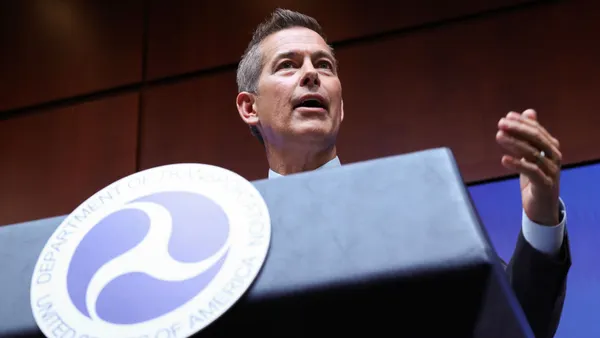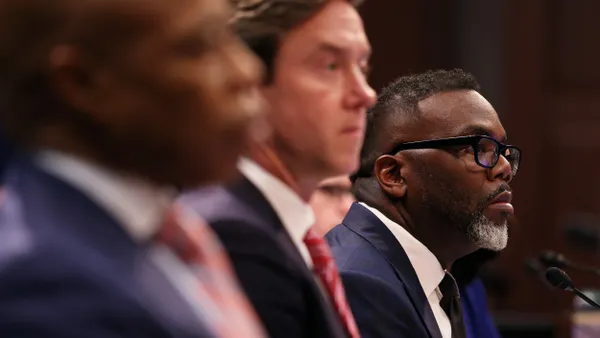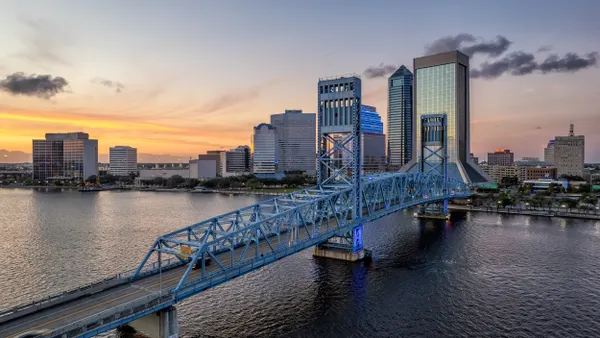UPDATE, Feb. 2, 2021: From Los Angeles to Philadelphia, homicide rates were 30% higher in 2020 compared to 2019 among a sample of 34 cities from across the country, according to a new study from the National Commission on COVID-19 and Criminal Justice, the University of Missouri - St. Louis, and Arnold Ventures.
The three largest cities studied — New York, Los Angeles and Chicago — accounted for 40% of the additional homicide victims in 2020. And the past year’s increase in murders could exceed the largest single-year increase of homicides at 13% in 1968, according to the report.
The authors said the spike in violence can be attributed to a "'perfect storm'" of factors that include the pandemic, police violence and the resulting unrest.
Dive Brief:
- U.S. cities from coast to coast are experiencing a trend of high, often record-breaking, rates of homicide amid a pandemic that has already killed at least 214,000 U.S. residents.
- The City of San Jose, CA, has recorded 33 homicides so far this year, compared to 36 total last year, KTVU reports. Washington, DC has seen 156 homicides, an 18% increase compared to 2019, according to WUSA. And Memphis, TN has seen at least 240 homicides, compared to 143 murders this time last year, according to a city spokesperson.
- Nationally, homicides and aggravated assaults increased 53% from June through August of this year compared to the same timeframe in 2019, according to a report by the National Commission on COVID-19 and Criminal Justice (CCJ).
Dive Insight:
A number of cities are on pace or have already reported all-time high homicide rates so far in 2020, despite more than two months remaining in the year.
Indianapolis recently broke its record for the most homicides seen in the city when it reached 180 people killed so far this year, according to Fox59. Spokane, WA is on pace to see a record-breaking number of homicides, reaching 17 deaths so far, the Spokesman-Review reports. And St. Louis has recorded 207 killings this year, according to the Associated Press, approaching the city's all-time high of 267 deaths in 1993.
Various explanations have been offered by experts to account for the rise in homicides, though the factor of a global pandemic is certainly a common thread throughout the trend.
COVID-19 must be subdued to halt the increase in violence, the August CCJ report writes. Many police officers have been taken off the job as a result of COVID-19 and are restricted in how they can perform their usual duties due to limitations from the virus, according to Professor Emeritus of Criminology and Criminal Justice at the University of Missouri-St. Louis Richard Rosenfeld.
The pandemic could also be creating "all sorts of unpredictable behaviors that experts don't understand yet," Vox reports.
Memphis, TN Director of Police Services Michael Rallings pointed to the pandemic in a recent statement when the city surpassed its previous record for homicides. "We've reached a grim milestone," he said in a video shared with Smart Cities Dive. "Due to the coronavirus, more people are isolated. There's more stress on families. Kids are doing virtual learning. We know that this ia a very stressful time. More guns have been sold, more guns are being stolen and there is more shooting."
The Indianapolis Metropolitan Police Department (IMPD) also pointed to the pandemic as a cause for its all-time high homicide rate this year.
"In this unprecedented time, we have not been immune to the troubling trend that has impacted cities across the United States," the IMPD said in a statement to Smart Cities Dive. "The COVID-19 pandemic has impacted our residents’ health, happiness, and livelihoods. And we are seeing more and more people who are turning to violence when confronted with conflict."
Other potential causes could be linked back to so-called "de-policing," or police officers who have withdrawn from their usual assignments due to concerns over increased legal liability, according to Rosenfeld. Additionally, communities of color, where instances of violence and police brutality tend to be highest, could be withdrawing even more from the police instead of seeking help regarding crimes, according to the CCJ report.
The violence will likely continue without effective violence-reduction strategies and police reforms, according to the report. Many cities are working to address those calls for reform, with a potentially record-breaking number police oversight measures on ballots in various cities this Election Day. The U.S. Conference of Mayors (USCM) also issued a report in August with five recommendations to address racial bias in policing and rebuild trust with local communities.
City officials and police departments should show a firm public commitment with highly publicized experimentation, signaling to much of the general public that officials are taking the calls for reform seriously, Rosenfeld said in an earlier interview.












